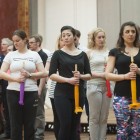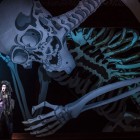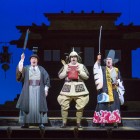Mikado 2016Scottish Opera
Read more about the opera Mikado
After a brief appearance at the Edinburgh International Festival, with an enjoyable concert performance of H M S Pinafore, Scottish Opera's 2015-16 season drew to a close with another contribution from the G & S canon, the company's first-ever production of The Mikado.
The omens looked promising. Martin Lloyd-Evans had done a wonderful job with his fresh, witty and intelligent production of The Pirates of Penzance in 2013. The welcome follow-up was generally worth waiting for, and, as expected, he produced some stimulating and novel ideas for The Mikado, still historically the most popular of the G & S repertoire. Dick Bird's set designs were extravagantly colourful, while also remaining surprisingly tasteful. Elsewhere the expected aspects were sent up in a restrained fashion - the tea ceremony could hardly have been less Japanese.
This production concept was a challenging one, to take elements from the Edwardian music hall and combine those with hints of Japanese culture. This began during the overture, where Ko-Ko, attired in a brightly theatrical 'oriental' costume, portrays a not altogether competent stage magician. There are further references of this kind later on - Ko-Ko goes on to enjoy greater success as a ventriloquist. and the chorus are generally dressed in a hybrid of styles. The men in particular have a variant of top-hat-and-tails with appropriate dance routines. The chorus are a larger group than G & S usually enjoys, and sound particularly good.
The cast was equally impressive, with Richard Suart demonstrating his skills as a seasoned veteran of the classic Jonathan Miller Mikado staging at ENO. This reading however was very different. While the opening night coincided with election day, with the polls still open, the knowledge of the results allowed him to augment his little list to amusing effect at the second evening. The idea of this being a performance constantly on display was signified by a frequently slipping accent. Andrew Shore's repertoire includes some very serious stuff, including Alberich, Wozzeck and King Priam. But his early roles included some hilarious comic turns (his Swedish Baron in La Vie Parisienne still lingers in the memory). His Pooh-Bah, restrained and dignified, while still pompous, provided the ideal contrast.
Nicholas Sharratt's Nanki-Poo was also successfully projected, with a selection of instruments in his one-man-band making his second trombone almost superfluous. His characterisation only just stayed the right side of upper-class twittery. Ben McAteer created a well-rounded character as Pish-Tush, his costume combining an exaggerated British colonial aspect, a safari suit including jodhpurs and solar topee, with hints of a samurai's armour. The title role is taken by Stephen Richardson, who made a very droll Private Willis in the Scottish Opera Iolanthe many years ago. He repeats that achievement here. His stature, in a grotesque naval uniform with bizarre face paint, ensures that he is able to dominate proceedings with ease, while using a smoothly elegant vocal delivery.
The ladies are led by the delightful Rebecca Bottone, who showed her talent for the bizarre in last season's Cenerentola. She has probably known the part of Yum-Yum since childhood, as her father was the first Nanki-Poo in the memorable Jonathan Miller staging at ENO. Her delivery of 'The Sun whose rays are all ablaze' provided a necessary moment of calm. The other maids make up an effective trio and handle their dialogue with aplomb. Rebecca de Pont Davies revealed a keen sense of the ridiculous a few years ago in A Night at the Chinese Opera, and is interesting casting as Katisha - the right kind of voice, but not the majestic figure usually expected. She arrives in a storm-tossed boat (Hokusai waves briefly dominating the set). Her black costume helps emphasise the parallels with Azucena that are in the music, and her make-up is fearsome. When she returns with the Mikado, they disembark from an impressive-looking royal yacht - a dreadnought. She reinforces her dominance of the court by revealing her complete boredom as she hears the Mikado trot out his song for what is presumably the umpteenth time.
Derek Clark had a great success taking over much of the run of Pirates, and did almost as well with this - indeed he drew out sonorities from the band that revealed an unexpected affinity with oriental tone colouring. Any minor issues should quickly settle down as the run continues.
Performance Cast
- Nanki-Poo the Mikado's son, disguised as a wandering Minstrel
- Pish-Tush a Noble Lord
- Pooh-Bah Lord High Everything Else
- Ko-Ko Lord High Executioner of Titipu
- Yum-Yum Ko-Ko's Ward
- Pitti-Sing Yum-Yum's sister, also Ko-Ko's Ward
- Peep-Bo Yum-Yum's sister, also Ko-Ko's Ward
- Katisha an elderly Lady, in love with Nanki-Poo
- Mikado of Japan
Production Cast
- Conductor
-
Derek Clark (May 5, 7, 8, 12, 19, 20, 21 m&e; Jun 1, 2, 3, 9, 10, 11, 15, 16 m&e; Jul 1, 2 m&e)
David Steadman (May 13, 14, 26, 27, 28; Jun 4, 5, 17, 18 m&e, 22, 23 m&e, 24, 25 m&e, 29, 30 m&e)
- Director
- Designer - Sets
- Designer - Costumes
- Lighting
- Choreography
- Orchestra
- Co-producer
Performance DatesMikado 2016
Theatre Royal, Glasgow | Glasgow
5 May, 19.15 7 May, 19.15 8 May, 16.00 12 May, 19.15 13 May, 19.15 14 May, 19.15
Eden Court Theatre | Inverness
19 May, 19.15 20 May, 19.15 21 May, 14.30 21 May, 19.15
His Majesty's Theatre, Aberdeen | Aberdeen
26 May, 19.30 27 May, 19.30 28 May, 19.30
Festival Theatre, Edinburgh | Edinburgh
1 Jun, 19.15 2 Jun, 19.15 3 Jun, 19.30 4 Jun, 19.15 5 Jun, 16.00
Grand Opera House, Belfast | Belfast
9 Jun, 19.15 10 Jun, 19.15 11 Jun, 19.15
Theatre Royal, Newcastle | Newcastle-upon-Tyne
15 Jun, 19.30 16 Jun, 14.00 16 Jun, 19.30 17 Jun, 19.30 18 Jun, 14.30 18 Jun, 19.30
Hippodrome, Bristol | Bristol
22 Jun, 19.30 23 Jun, 14.30 23 Jun, 19.30 24 Jun, 19.30 25 Jun, 14.30 25 Jun, 19.30
Mayflower Theatre | Southampton
29 Jun, 19.30 30 Jun, 14.00 30 Jun, 19.30 1 Jul, 19.30 2 Jul, 14.30 2 Jul, 19.30











